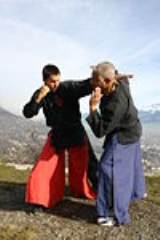
Pongyi thaing
Encyclopedia

Oopali
Oopali or Upali was a 9th century Burmese monk who is credited with founding pongyi thaing and establishing a Buddhist order. His order still exists today in Myanmar, Thailand, Cambodia and Laos but his fighting art disappeared...
in the 9th century. Based on the Hindu-Buddhist principle of non-violence and non-aggression, its objective is not to cause maximum harm but simply to defend oneself. The word pongyi means monk and thaing is an umbrella term for Burmese martial arts.
Pongyi thaing is an integrated system of developing the body, mind and spirit to achieve harmony with oneself, with others and with nature. Style are generally determined by the level of emotional control during confrontation. Levels of emotional discipline determine the nature of action and reaction.
See also
- Burmese martial arts or Thaing (burmese)
- BandoBandoBando is a defensive style of thaing focusing on animal-based techniques. The earliest meanings of the word were self-discipline, self-development and self-improvement. Later, it came to mean self-protection or self-defense...
- BanshayBanshayBanshay is a weapon-based Burmese martial art focusing primarily on the sword, staff and spear. Influenced by both Chinese and Indian sources, it is also closely related to krabi krabong and thang-ta....
- LethweiLethweiLethwei is an unarmed Burmese martial art. It is similar to related styles of Indochinese kickboxing, namely Muay Thai from Thailand, pradal serey from Cambodia, Muay Lao from Laos and tomoi from Malaysia.- History :...
- NabanNabanNaban is a style of wrestling from Myanmar. Related to Tibetan and Cambodian grappling arts, naban was originally based on Indian wrestling. It became popular in rural areas where it was often performed at festivals alongside lethwei matches. Naban is most commonly practiced by the tribal peoples...

